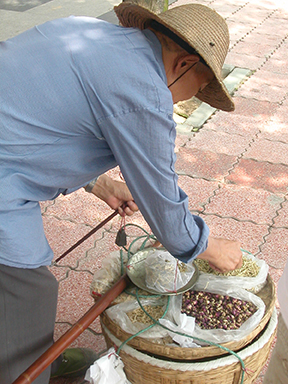
A farmer sells herbs on the streets of Cheng Du
By Robert L. Felt, Co-author Understanding Acupuncture
Questions About Modern Chinese Medical History
What is the difference between “Traditional Chinese Medicine” and TCM?
This depends on whom you read. TCM means “traditional Chinese Medicine” but is the most-used English term for the standardized system that was developed in the People’s Republic of China since the Liberation of 1949. This is a subset of traditional Chinese medicine, the medicine developed in the centuries-old medical literature of China and East Asia. “TCM” is also used at times to refer to “integrated medicine,” the centerpiece of officially sanctioned traditional medicine in China today. In this, traditional techniques are associated with biomedical conditions and used in concert with biomedical treatments. Different writers use the terms differently, but the TCM discussed by Western writers is most commonly the standardized system developed in the PRC.
If TCM has been so adapted to modern times, are’t claims that it has “passed the test of time” hard to justify?
Again, it depends on who is asking the question. There is a cultural continuity from the beginnings of medicine in China to the modern day but Chinese traditional medicine has constantly adapted to the challenges of the Chinese people. History informs us that what most clinicians do today is relatively modern. However, the skeptical claim that TCM has no clinical validity and has survived in the modern period only by political and social bias is completely groundless from the viewpoint of history. TCM has survived in China despite social and political forces, and organized attempts to eliminate it. TCM may not have survived unchanged since the first century CE, but it certainly survived a trial by fire during the last 50 years, as well as in its long prior history. Today at the beginning of the Twenty-First century conflict still continues between those who see Chinese medicine as a cultural and practical boon to the Chinese people and those who see it as an embarrassment to Chinese science.
In effect, both attempts to justify Chinese medicine and attempts to debunk Chinese medicine by reference to history are unworkable. It is a long and complex history; therefore, many claims can be justified by selective emphasis on particular events or trends. Considered overall, its survival as an active medicine in the People’s Republic is more a testimony to its utility than to cultural bias.
Almost everyone talks about ‘Chinese herbal medicine” but scholars use difficult terms like “pharmacotherapy” or “naturally-occurring drugs,” what is the difference?
Chinese medicine is not simply herbal. It uses herbs, virtually every plant part, minerals, animal materials and even waste products. Further, unlike herbal medicines, the raw medicinals are processed, prepared to modify their effect. They are not prescribed like herbs – one by one in a tincture, tea or tisane – but in combinations typically called `formulas,’ which are prepared as decoctions, powders or pills. Writers who use “herbal” want to emphasize simplicity and safety by association with the gentleness ascribed with Western herbals. Writers who use “pharmacotherapy” want to emphasize the conceptual and clinical sophistication of this traditional Chinese discipline.
If the Chinese people no longer believe in traditional explanations, preferring science, how do these treatments work?
The idea that acupuncture and naturally-occurring drugs work because of belief is really a claim that these arts cure via the “placebo effect” In other words, it is a claim that it is the faith in these arts that cures, not the treatments themselves. This is one of the ironies of skeptic’s claims. The facts on the ground in China are almost opposite the type of social climate likely to produce an enhanced placebo effect. Nonetheless, skeptics use the circumstances of some few practices in the West to justify the notion that practitioners create an enhanced placebo effect that is responsible for the reported cures.
While there is as yet no definitive answer as to the function of acupuncture and traditional Chinese medicine, the human body and its interwoven systems have not changed all that much since traditional medicines were first created. As research reveals more and more of the mechanisms of function, the overzealous claims of both closed-mined skeptics and charlatans will likely be proven short-sighted.
There are mechanisms to explain acupuncture’s effects. One of those is the X-Signal system proposed by Paradigm Author Yoshio Manaka, MD. It offers a scientifically testable method of operation based on the idea that acupuncture initiates a DC current signal that is mediated through the fascia and alters brain, then endocrine and other bodily processes. The fact that people can say that “there is no scientific proof” for acupuncture or Chinese medicine has a much to do with the lack of funding for such research and the rejection from western thought of science performed in Asia.
Are there specific conditions for which acupuncture is effective?
This is another question that depends on who you ask. There are still people who believe acupuncture is a long-term fraud, that it cures nothing and that its survival in China is the result of Chinese people’s unquestioning belief. However, with acupuncture and Chinese formulas playing an ever-increasing role in the health care of western societies, these dismissals become less believable every day.
